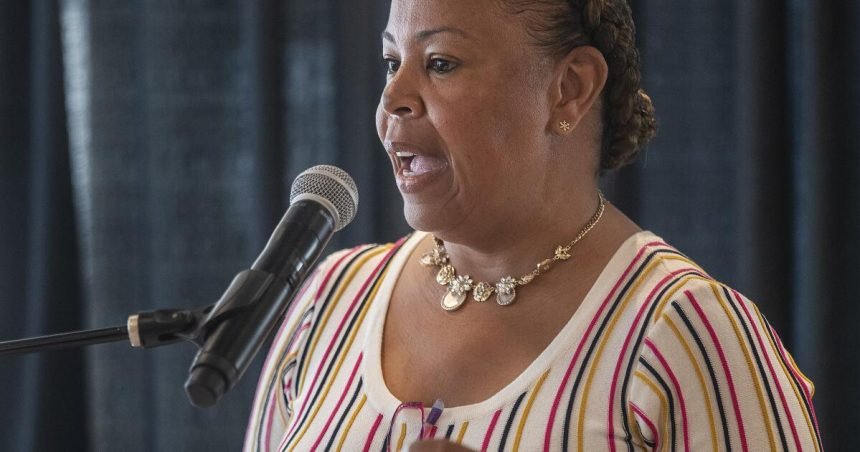Fesia Davenport, Los Angeles County’s chief executive officer, received a $2-million settlement this summer due to professional fallout from Measure G, a voter-approved ballot measure that will soon make her job obsolete, according to a letter she wrote to the county’s top lawyer.
Davenport wrote in the July 8 letter, which was released by the county counsel through a public record request Tuesday, that she had been seeking $2 million in damages for “reputational harm, embarrassment, and physical, emotional and mental distress caused by the Measure G.”
Under Measure G, which voters approved last November, the county chief executive, who manages the county government and oversees its budget, will be elected by voters instead of appointed by the board. The elected county executive will be in place by 2028.
“Measure G is an unprecedented event, and has had, and will continue to have, an unprecedented impact on my professional reputation, health, career, income, and retirement,” Davenport wrote to county counsel Dawyn Harrison. “My hope is that after setting aside the amount of my ask, that there can be a true focus on what the real issues are here – measure G has irrevocably changed my life, my professional career, economic outlook, and plans for the future.”
The existence of the $2-million settlement, finalized in mid-August, was first reported Tuesday by LAist. It was unclear then what the settlement was for.
Davenport, a longtime county employee, was appointed chief executive in 2021.
Under the terms of the settlement, Davenport cannot sue the county, including for “any claims arising out of the facts and circumstances surrounding the enactment of the ballot proposition known as ‘Measure G.’ ”
Davenport began a medical leave last week and told staff she expects to be back early next year. She did not immediately respond to a request for comment on the settlement.
Davenport’s Aug. 12 letter stated that other department heads had received significant payments upon departure. She noted the prior chief executive officer, Sachi Hamai, had received $1.5 million. The letter also makes an apparent reference to Mary Wickham and Rodrigo Castro-Silva, mentioning the former county attorneys by their last names.
Wickham received about $449,000 in severance pay and Castro-Silva received $213,000, according to records obtained by The Times.
“My circumstance is different in that I am not seeking to leave, and I have suffered damages, through no fault of my own,” she wrote.
Supervisors Lindsey Horvath and Janice Hahn first announced Measure G in July 2024, branding it as a long-overdue overhaul to the county’s sluggish bureaucracy. Under the charter amendment, the number of supervisors increased to nine and the county chief executive will now be elected.
On Aug. 12, 2024, a few weeks after the announcement, Davenport wrote a letter to Horvath saying the measure had impugned her “professional reputation” and would end her career at least two years earlier than she expected, according to another letter released Tuesday through a public records request.
“This has been a tough six weeks for me,” Davenport wrote in her letter. “It has created uncomfortable, awkward interactions between me and my CEO team (they are concerned), me and other departments heads (they are apologetic), and even County outsiders (they think I am being fired).”
Horvath said in a statement the ballot measure created a “more transparent and accountable government.”
“I’ve said it before and I’ll say it again: L.A. County government is broken,” she said. “Measure G, which was approved by L.A. County voters, puts the power back in the hands of the people.”
The position of elected CEO was by far the most controversial part of Measure G. Supporters said that making the chief executive elected rather than appointed would bring more accountability to one of the county’s most powerful posts. Opponents warned it would consolidate too much power with one person and bring politics into a fundamentally bureaucratic position.











